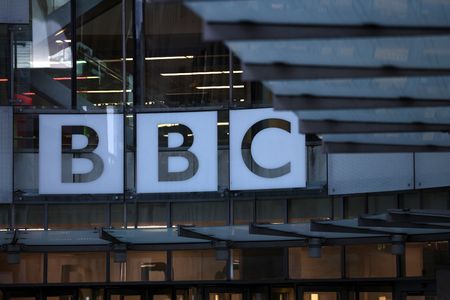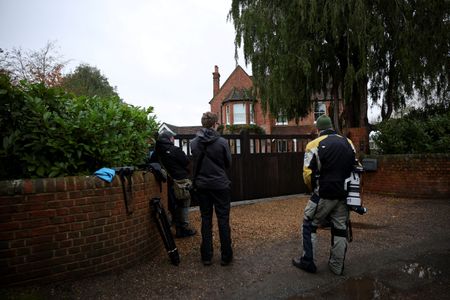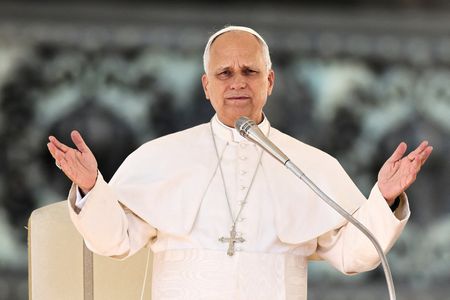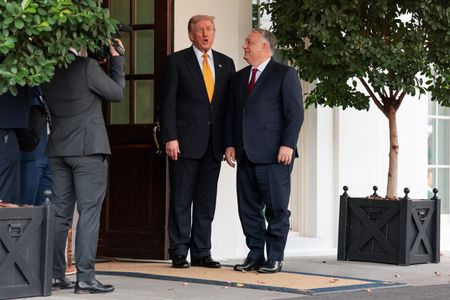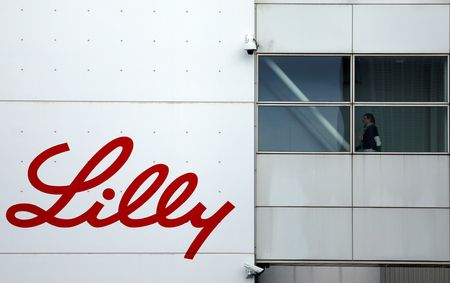By Kate Holton, Paul Sandle and Sam Tabahriti
LONDON (Reuters) -Top-level resignations from the BBC over the editing of a speech by President Donald Trump have blown the lid off wider tensions at the British broadcaster over how it is run and whether it still commands public trust in its journalism.
Director General Tim Davie and head of news Deborah Turness quit on Sunday after an internal report by a former adviser that was leaked to the Daily Telegraph cited failings in its coverage of Trump, the Israel-Hamas war and transgender issues.
But rather than contain the scandal, the resignations have plunged the British institution into its biggest crisis in decades, with the publicly-owned broadcaster left without a leader just as it faces a review of the charter that determines its funding.
Even the BBC’s supporters acknowledge that the current licence fee – paid by all television-owning households and a large part of its funding – is increasingly out of date when viewers are turning to the likes of Netflix, YouTube and social media for news and entertainment.
BBC RELIES ON PUBLIC TRUST
“The most important asset the BBC has is trust, and its reputation is based on the fact that its news provision is impartial, it’s objective, it’s properly sourced and checked,” John Whittingdale, a Conservative lawmaker and former government minister for media, told Reuters.
“And if viewers and listeners no longer can have confidence in that then that is hugely damaging to the BBC.”
Claire Enders, founder of Enders Analysis, said a new leader should be appointed as soon as possible to “restore the trust there has to be in the BBC for it to survive the charter”.
Established in 1922, the BBC is one of the world’s oldest media organisations and has been respected worldwide for its journalism. The group currently broadcasts in 42 languages.
As well as airing TV and radio, the BBC, which is a client of Reuters, runs the biggest English-language news website in the world, according to the industry magazine Press Gazette.
LEAKED MEMO SUGGESTED INSTITUTIONAL BIAS AT BBC
Last week The Telegraph published excerpts of the memo written earlier this year by a former standards adviser, Michael Prescott, who listed what he said were editorial failings that revealed institutionalised left-leaning bias among staff.
The most serious was the revelation that a Panorama documentary aired just before the November 2024 U.S. presidential election had spliced together two parts of a Trump speech so he appeared to be encouraging the Capitol Hill riot of January 6, 2021. The documentary was made by an independent production company.
Trump has threatened legal action against the BBC: the president’s lawyers said it must retract its documentary by November 14 or face a lawsuit for “no less” than $1 billion, according to a letter sent on Sunday. The BBC, which admitted on Monday the editing was an “error of judgement”, said it was considering how to respond.
Prescott, a former Sunday Times political journalist, said he had compiled his memo because he was in “despair” at a lack of action by BBC bosses when failings came to light.
After the memo was published, the corporation seemed paralysed for days, saying only that it did not comment on leaked documents.
The BBC’s media correspondent, Katie Razzall, and one of its top political presenters, Nick Robinson, both said they had been told there was a clash with the board, with news executives wanting to publish an apology and the board preventing it.
The two also pointed the finger at board member Robbie Gibb, a spokesman for Theresa May when she was Conservative prime minister, as a critic of the BBC’s news output. Gibb did not immediately respond to a request for comment.
In response, Chairman Samir Shah said the board had not blocked an apology but had wanted time to respond.
He said board members held different views and engaged in robust arguments, but the suggestion by some media commentators that a “coup” had taken place with the resignations of Davie and Turness was “fanciful”.
Shah apologised for the Trump edit but said “the BBC News’ DNA and culture” was impartiality. He said surveys showed Britons trusted BBC News more than any other news outlet.
SUPPORTERS BELIEVE THERE WAS CAMPAIGN AGAINST BBC
Supporters of the broadcaster, including journalists at the Guardian and the Financial Times, and some BBC staff, believe there was an orchestrated right-wing campaign to undermine the corporation, according to public statements.
“This is a crisis created by political and commercial opponents to public service broadcasting and the BBC,” Diane Coyle, an economist and vice chair of a former BBC governing body, told Reuters.
The supporters say daily leaks of criticism from the memo ramped up pressure, while high-profile figures such as former Conservative Prime Minister Boris Johnson fuelled the controversy.
Alan Rusbridger, former editor of the Guardian who now heads Prospect magazine, said many on the BBC board came from a background of finance or business, or had not worked in journalism for a long time. He said as well as a new director general, the corporation needed stronger governance.
“The board itself is not really well placed to make fine editorial judgements,” he told Reuters.
“Any director general coming in would want to know who’s got their back and whether there are people who can make the judgements and defend the journalism when it needs to be defended, or reach sophisticated judgements on when it needs to be corrected or apologized for.”
LICENCE FEE MODEL
The scandal comes as the government prepares to review whether the BBC’s licence fee model is sustainable and whether other options should be considered as part of the charter renewal. The current 10-year charter expires in 2027.
A spokesperson for Labour Prime Minister Keir Starmer said the government supported the BBC and denied it was institutionally biased.
The BBC has long faced intense scrutiny from many national newspapers and critics on social media, who object to its funding model and perceived liberal stance.
The organisation’s revenue rose 9% to 5.9 billion pounds ($7.9 billion) in 2024/25, driven by the licence fee and commercial income, but the number of people cancelling their licences has been increasing in recent years.
The loss of 300,000 licences last year alone cost the BBC around 50 million pounds in income.
($1 = 0.7451 pounds)
(Reporting by Kate Holton, Paul Sandle and Sam TabahritiEditing by Frances Kerry)

